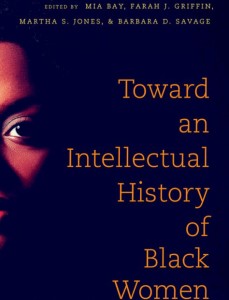Mia Bay, Farah J. Griffin, Martha S. Jones, and Barbara D Savage, editors. Toward an Intellectual History of Black Women (University of North Carolina Press, 2015).
Review by Lilian Calles Barger
When thinking of black women in history, Ida B. Wells, Zora Neale Hurston, or Pauli Murray may come to mind. Going further back into the nineteenth century, we may think of Sojourner Truth, Harriet Jacobs, or any number of authors of slave narratives. Their actions impress us. However, we are less likely to think of these women as forming a subfield of intellectual history. Black women usually show up alongside white women and black men fighting for political rights and rarely stand alone as a group of thinkers. Mia Bay and the editorial team of Toward an Intellectual History of Black Women want to change that. They have brought together a strikingly good collection of essays presenting us with a sampling of a neglected field of thought. The collection came about through a series of interdisciplinary meetings begun at Rutgers University in the spring of 2002. All sixteen essays focus on black women in the diaspora of North America, the Caribbean, and Africa as subjects of critical thought and articulators of ideas. In defining this focus, the authors demonstrate the particularity of black women’s thought at the intersection of race and gender. The aim of the editors is to bring attention to a stream of thought that remains largely unrecognized in intellectual history.
In claiming a distinct field, the editors recognize that black women’s intellectual history suffers from several handicaps. They charge that there is “resistance” in the field of intellectual history to the implications of black women’s thought (4). Attention has been concentrated in literary criticism, in which “exceptional” pieces of writing are viewed in isolation; attention to their place in history is rare (3). When it comes to advocating for the race, black men like David Walker, Frederick Douglass, and W.E.B. Du Bois come to mind. Black women identified with social movements are often seen as activists, as doers rather than thinkers. These essays challenge the binary categorization of ideas and actions that results from such a scheme. The editors note the influence of social history 
and feminist scholarship, which—by identifying the role of black women in defining freedom, democracy, and citizenship—has opened the field as worthy of study.
Additionally, challenges internal to the field are many. The informal nature of much of early black women’s thought, their historical lack of formal education, and their religiously laden language may cause them to appear inarticulate in matters of racial and gender politics. The paucity of written texts, particularly for the eighteenth century and much of the nineteenth, make construction of black women’s thought a project akin to archaeology. However, this limitation does not deter these scholars. Deeper excavation into the rhetorical strategies, the “articulate silences,” and evidence at the margins of essays, political tracts, novels, poetry, letters, speeches, spiritual narratives, and eyewitness accounts are adding new fodder to the historiography of black women’s thought (19).
The essays demonstrate how slavery, segregation, and racial discrimination shaped black women’s reflection on experience and the many means by which they, often indirectly, challenged ideas about race and gender. The collection covers a range of topics including race science, the meaning of black women’s bodies, respectability, political theory, feminism, and, in one notable example, the influence of Alice Walker on the creation of New Southern Studies. The time period is expansive, starting with Arlette Frund’s “Phillis Wheatley: A Public Intellectual,” which considers her Poems on Various Subjects, Religious and Moral (1773) and continuing to the Clinton–Obama contest, examined in “Histories, Fiction, and Black Womanhood Bodies: Race and Gender in Twenty-First Century Politics” by Martha S. Jones. Jones demonstrates how the 2008 campaign replicated the cultural assumption in which “African Americans were men and all women were white,” ignoring the intersectionality and place of black women in political culture (274). Melissa Lacewell-Harris and Michelle Obama drew on black women’s history to publicly take on their erasure. This essay alone provides significant justification for the need to explore the history of black women’s thought.
Additional essays, including Natasha Lightfoot’s “The Hart Sisters of Antigua” and Jon Sensbach’s “Born on the Sea from Guinea,” cover women of the eighteenth and nineteenth centuries. Lightfoot examines how the mixed-race Hart sisters, married to white men, used religion to claim “respectability to cultivate public politics” (54). Drawing from baptismal records, letters, and missionary reports, Sensbach provides a portrait of the religious responses to the middle passage of newly Christianized and enslaved woman Rebecca Protten. Christianization, the African cultural legacy, and the experience of middle passage created new kinship ties among the enslaved, with women as spiritual leaders in black churches in which women predominated. Mia Bay, in “The Battle for Womanhood Is the Battle for Race,” demonstrates how nineteenth-century black women seeking to establish the “ ‘quiet undisputed dignity’ of womanhood” avoided public speaking on race (89). In an 1832 Boston speech Maria Stewart was one of the first black women in the nineteenth century who directly challenged racist thinking. While women were active in race uplift, it was the task of black men to assert themselves in the categorically male discourse over the “races of man” (87).
Addressing intellectuals of the twentieth century Kaiama L. Glover’s “Daughter of Haiti,” examines how the novels and political non-alignment of Marie Vieux Chauvet (1916-1973) challenged the male-dominated Haitian national narrative, placing her in a radical intellectual tradition in which political action was requisite. Chauvet wrote in resistance to both the “ruthlessly brutalizing, authoritarian government,” and “the constraints of elite female subjecthood”(155). Sherie M. Randolph’s “Florynce Kennedy and Black Feminist Leadership in the Reproductive Rights Battle” demonstrates how the radical lawyer Florynce Kennedy made a significant contribution to the history of abortion rights arguments. Her court activism and 1971 essay “Black Genocide” rejected the theory that abortion amounted to “race suicide” and challenged both antiabortionists and black nationalists advocating for black families against the interest of black women (241).
As it stands, the collection is an excellent source and a promising movement toward constructing a transnational history of black women’s thought. Building on this collection, future work could expand the editors’ definition of the African diaspora to include Latin America. More Africans found themselves in South America than in North America, with Brazil, in particular, becoming one of the most diverse countries in the world, with a trove of Afro-American thought. The common experiences of the middle passage, enslavement, and emancipation provide an opportunity for much fruitful work across the hemisphere. Complementing the authors’ consideration of intersectionality, more attention to ideas moving across gender, class, race, and region would place their subjects in a broader context. There is also the issue of racial mixture and colorism, evident in more than one essay, that is never fully addressed, calling for further interrogation of the instability of race these women experienced. Even with these caveats, this collection remains an excellent exploration of the diversity and salient features of black women’s intellectual tradition.
Lilian Calles Barger, (Ph.D. University of Texas at Dallas), is an independent scholar and podcaster with New Books Network working in Taos, NM (here is her podcast interview about this particular book).  She serves on the book review committee of the Society and is currently editing the Classic Series. She is working on a book manuscript entitled The World Come of Age: Religion, Intellectual and the Challenge of Human Liberation on the origins of the radical liberation theologies of the 1960s and 70s.
She serves on the book review committee of the Society and is currently editing the Classic Series. She is working on a book manuscript entitled The World Come of Age: Religion, Intellectual and the Challenge of Human Liberation on the origins of the radical liberation theologies of the 1960s and 70s.

0